I’m Trying to Fight Against the Machine
It is me (and every creator online) vs the algorithm. Who will win?
There’s a conversation happening on Substack right now that you may have seen play out on other social media platforms - LinkedIn, Instagram, Twitter, Facebook, maybe even MySpace…
We’re witnessing a pushback against Substack creators who are telling other creators on Substack how to grow big on Substack. Confused?
This note summarizes it well:
Here’s the thing - the internet has changed. It was fun and quirky and weird in all the right ways, and now… well, now it’s mostly work, distractions, manufactured outrage, and bots talking to each other.
We’ve built the internet, and social media in particular, in such a way that your sense of worth, intelligence and success is directly proportional to the number of heart emojis on a screen.
There’s this comic I think of often as a creator:
I thought of it earlier again this week when Bianca (my marketing person) and I sat down with the agency that handles our social media, which to be honest, hasn’t been doing so great lately.
Over the last year, we’ve posted every… single… day. Even on May 4th when I should have been binge-watching all of the Star Wars movies.
We’ve tried (almost?) everything - “carousel” posts (sadly without the horseys,) photographs (if my wife, Pretzel, tags me as a collaborator), and the occasional reaction video 🤯. But most of the time it’s a highly polished video with nice editing, graphical overlays, and my nerdy face. I’m told video is soooo hot right now.
When we first started with this agency, we focused on sharing clips of me on stage speaking. I am, after all, a keynote speaker, and I know my message resonates with my live audiences. So we naturally assumed people virtually might also find it valuable.
We assumed wrong.
We had some moderate success talking about Extroverts vs Introverts or that time MS Paint helped me get a job, but, as it turns out, I don’t naturally speak in TikTok sound clips, so the results were more 'meh-dia' than media buzz." (I hope it’s not my terrible puns that are tanking our efforts.)
So we decided to try “talking head” videos (as opposed to talking elbow videos, though maybe it’s worth a shot). This is where I speak directly to the audience (aka camera) in this precise social media format:
Hook
Interest peak
Value (or Entertainment)
Call-to-Action
This went gangbusters at first. Our first video to “pop” was back in October when I talked about the humor personas (117k views). Two weeks later we had an even bigger jump when I explained the comic triple (423k views).
At that point, I was riding high. The views, likes, and follows were flooding in and we exploded from 6k followers on Instagram to 21k by February.
We assumed we were geniuses and I was on my way to being the Brené Brown of humor.
We assumed wrong, again.
Since then… well since then we’ve gained -700 followers in three months. That’s right, we’ve posted content 90 days in a row and lost 700 followers.
So, what happened? How does creating more of what worked before lead to less followers? That’s what we were trying to figure out in the meeting. There seem to be a few possibilities:
Possibility #1. The algorithm changed.
At the risk of sounding like the dude in the comic above, it is true that the algorithms are constantly changing. What works one day may not work the next. And what works on one platform may not work on another. (The video that netted 400k views on IG, got 246 views on TikTok, and 67 on YouTube - make it make sense.)
There’s this seductive appeal to knowing that if the algorithm winds blow just right, within minutes it can reach millions of people around the world.
The problem is that I would rather spend my time and brainpower on teaching people how to enjoy their work more, not on split testing whether it’s better to say “Link in bio” or “comment quiz below.”
Possibility #2. We’re not doing it right.
Related to #1, it’s possible we’re just not doing social media correctly. Maybe it’s my introvertedness that makes me prefer the “media” part of social media over the “social” part of it.
According to the agency, we have hurt our reach by experimenting too much.
We’ve been trying out some podcast content on our feeds recently, both with me as a guest or from our upcoming podcast (spoiler alert) and apparently, those videos haven’t done great (we’re still learning.)
And because they’ve done poorly, it’s “throttled” our other content from doing super well. It turns out the algorithms are like bratty teenagers - picky and a little spiteful (:
Even if I don’t want to create content for algorithms, I’m told the cream no longer rises to the top because it's drowning in low-fat milk.
So in order to reach more people. you have to get in front of as many eyeballs as possible. And we need technology to do that… so we’re back at square one.
I just want to create interesting, compelling, funny, and meaningful content that inspires, educates, or at least entertains people. But I also want people to see it. So it seems like we HAVE to play the algorithm game, the platforms won.
It’s not quite the takeover of computers like The Matrix (yet), but it does feel a bit dystopian to be creating content for algorithms, and for ChatGPT to be used for art while humans are doing manual labor.
Possibility #3. My content isn’t good.
The third reason it may not be performing well is that maybe my content isn’t just that good. Aside from some previous success, maybe I’ve used up all of my good ideas and I’ve run out of interesting things to say.
Maybe I am the dude in the comic.
If I was new to the content game, I would believe this to be true. I can’t imagine starting out as a speaker or comedian these days, and having my ideas judged before I’ve ever had any chance to develop my ability to craft and shape them.
I would look at these results and think, “Yup, I’m done, might as well stop trying and go back to being a project manager.”
But I do have some reason to believe that my overall message resonates with people. 14 million people have watched my TEDx talk. I’ve done over 2,000 engagements and have been booked (and re-booked) by some incredible organizations. 12,000 active users are signed up for this newsletter and my mom still says I’m funny.
Some of my ideas are indeed worth spreading #TED.
So we return to the question, what happened?
The reality is that it’s probably some combination of the three. The algorithms have changed, we’re not quite doing it right, and my content isn’t where it needs to be. At least it hasn’t been of late.
If I’m honest, which I’m only realizing now as I type this, I’ve been trying to create content that perfectly fits the algorithm rather than content that I think can transform people’s lives (or maybe their day, or at least, like, 45 seconds).
I started writing this post thinking that it might lead to me announcing that I’m quitting social media entirely.
But I don’t think that’s the right thing to do (at least not yet).
While social media is terrible in a lot of ways, the reality is that it is essential to modern life. And maybe, just maybe, if my session interrupts some doomscrolling, or provides a quick smile or a deep thought in between cat videos, that’s enough to positively impact someone’s day.
So instead of giving up, maybe I should be shaping up. I want to shift my focus in social media back to value, not views. So even if only 5 people see our content, as long as it helps them to be a better human, it’s worth it.
We’ll play the algorithm game within the comfort of our ethics. The people at the agency, bless them, are only doing their job. So when they recommend I do content around “how to use humor to get chicks” it doesn’t mean I will (or will I?)
This is something that Bianca is working on building and popularizing—a new branch of marketing called “Humane Marketing.”
That means working against predatory clickbait, manufactured urgency, psychological manipulation, and addictive designs that keep us glued to our screens, engaged and enraged. (If these are topics that interest you personally, Bianca writes over at
.)You can rest assured that no matter how you interact with us, via social media, email, website, or MySpace, we’re very careful to preserve both your dignity and ours.
And if we happen to do that in a way that makes me the Brené Brown of humor, so be it. If you want to see how it goes, feel free to connect with us on LinkedIn, Instagram, YouTube, and/or Facebook.
(an)drew
PS. One thing we do know is that first impressions are critical across all platforms. To that end, we have a TEDx talk coming out that we’re really proud of. I think it’s well-delivered, funny, and has an important message about understanding your own humor.
We just want it to get a fair shake from the algorithm (or maybe even a slightly biased one in our favor), so we’re creating a launch team to help when the talk comes out (sometime over the next month or two). If you’re willing to help out, click here to find out more details.
PPS. In the spirit of the aforementioned TEDx talk, my brother and I are doing a free, workshop on the art of public speaking. Join us! We go live next week.


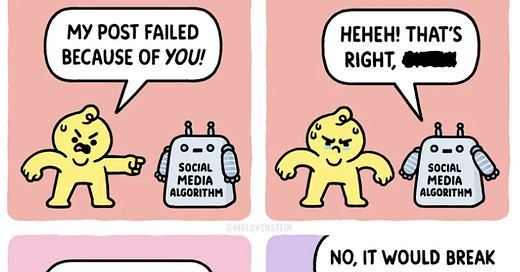



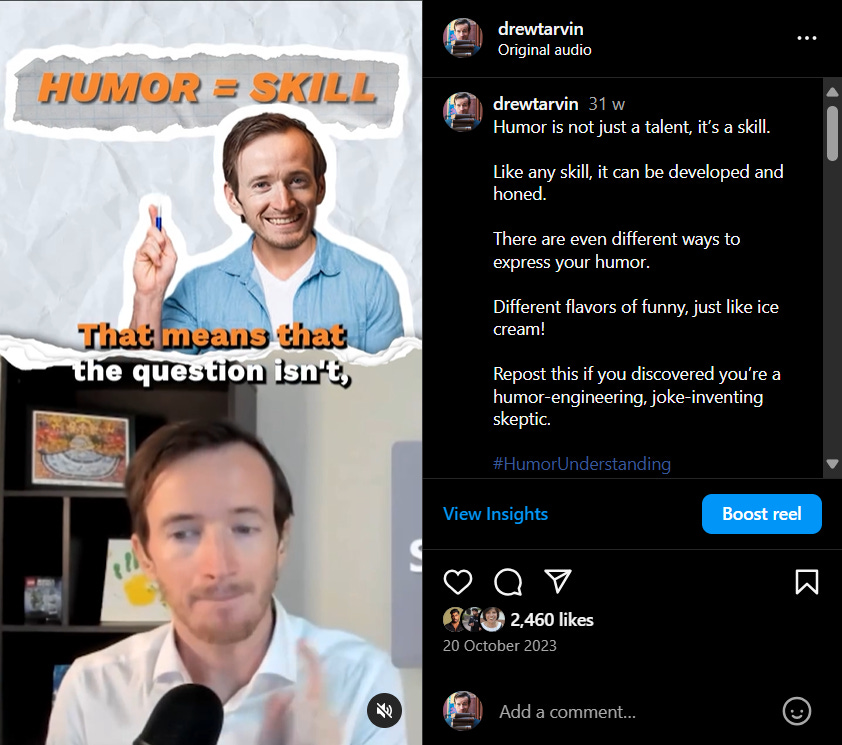
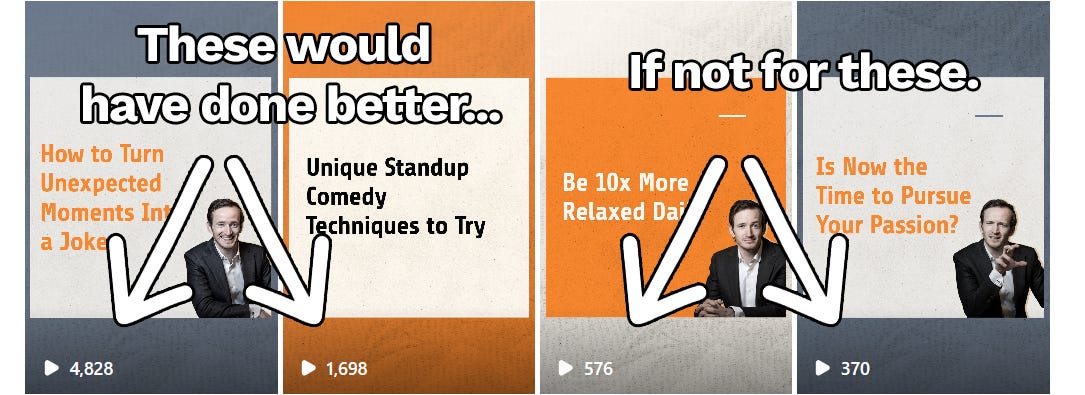
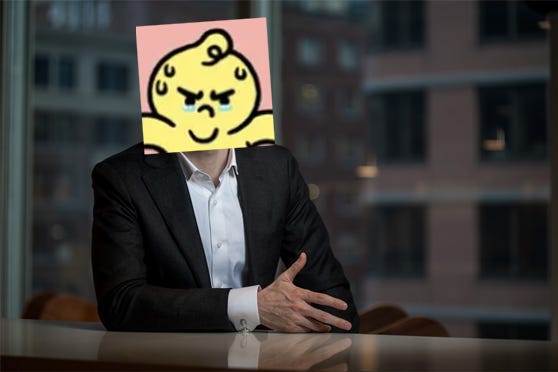

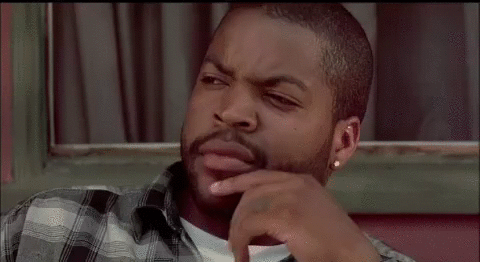
Maybe frequency of posting is also affecting your audience, posting every day does look a bit needy and gives your audience a daily decision as to whether to unfollow you.
I’d try posting less, so they look forward to and value your posts. 🤓
As a fellow "funny" person trying to do "authentic actually help people and not make them fight" content I feel your pain and the collective silence of social posts.
One piece of advice I got is to do the social media YOU enjoy doing-be it videos, writing, etc
Another piece of advice comes from the musical poets 311 in their song "Jackpot" that I've been repeating to myself between yelling into a void virtually and a pillow IRL about trying to reach people:
"We only enter in one contest
That we made up ourselves
That's to be the 311'est"
Are they as big as the angry bands of the 90's like Limp Bizkit et al? No, they in fact did not do it all for the Nookie.
But they have a loyal fanbase, share a message of positivity, and have been together as a band, making a living making music to people that love them for 30+ years.
They won by being the best version of themselves and having a rabid, large, but not monumentally huge, fan base.
It's a lesson I have been trying to take to heart: my contest is not to compare myself to others (say people with 12,000 subscribers versus 221 but who's counting), but to keep creating writing, speaking, and jokes that I have fun with, help others, and will support the life I want to live.
Define your OWN success, and be the most Drew Tarvin-iest you can. Because it's pretty darn great.